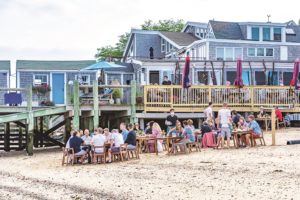PROVINCETOWN — Judge Michael Vhay of Mass. Land Court told the owners of Sal’s Place last week that they needed to come up with some evidence soon to justify the beach seating of diners behind their neighbor’s home, or else they will face even harsher penalties than the current $1,000 daily fines he has imposed.
Sal’s Place owner Siobhan Carew and her daughter, Michela Carew-Murphy, are being sued by their neighbor Gregory Connors over their use of the intertidal land behind Connors’s house as a dining room. The suit is the latest chapter in a six-year dispute between the owners of 99 and 101 Commercial St.
The select board granted permission in 2020 for Sal’s Place to use its beach to ease the restaurant’s troubles resulting from Covid-19 indoor seating restrictions. That is when the Carews began serving behind Connors’s property, too. The select board has supported the use of the extended beach area behind Connors’s house against the advice of both town counsel and the town building commissioner.
In May of this year, Judge Vhay issued an injunction barring the restaurant owners from using an easement for parking between Sal’s and Connors’s properties and barring use of the intertidal lands behind Connors’s house for anything other than fishing, fowling, or navigation. Such uses are permitted to all members of the public under the Massachusetts Colonial Ordinances, dating back to 1641.

When the restaurant owners ignored his order, Vhay began levying $1,000 daily fines for contempt of court on July 23.
On Aug. 3, Vhay held a contempt hearing to gather evidence on whether the restaurateurs had indeed been violating his injunction. Vhay heard testimony for two hours from the technician who services Connors’s five security cameras and another hour of testimony from West End neighbor Don DiRocco of Hammer Architects, who designed Connors’s home. Both witnesses stated that they observed tables on the beach and patrons using the easement. At the trial’s conclusion, Vhay announced that he would find Carew and the restaurant itself in contempt.
Judge Vhay then asked what he could do to get the restaurant owners to comply with his orders. He gave them until Aug. 6 to file an appeal of the injunction or “I will have to force the sheriff to come down to enforce the order or throw Siobhan Carew in jail.”
When the Carews’ attorney, Anthony Panebianco, of Rhode Island, argued that the restaurant owners will lose money if they cannot serve behind Connors’s home, the judge shot back: “Your client, I rule, has no right to be there.”
If it is not profitable to serve customers on their own property, that “does not give them the right to operate a restaurant at your house or on Boston Common,” he said. “That is not the way it works.”
The Provincetown Select Board is not convinced that Judge Vhay has it right. In previous interviews and public meetings, the board members indicated they are waiting to hear more from the judge about the intertidal lands west of Howland Street in Provincetown, which is considered the Province Lands and is treated differently than the intertidal lands in the rest of the state, according to the town’s website.
A 1920 Supreme Judicial Court case, Esrael Sklaroff v. the Commonwealth, found that upland property owners who live in the Province Lands do not own their property beyond mean high water. Throughout the rest of the state, upland property owners generally own to mean low water. Thus, the Carews argue, Connors does not own the intertidal lands and has no right to say they are trespassing. According to town counsel and the decision in Skarloff, the state owns the intertidal lands between high and low water west of Howland Street.
The Carews argue that the town has the right to allow a restaurant to operate there during the pandemic.
But every time Panebianco tried to use this argument in the contempt hearing, Vhay said the restaurant’s lawyer has not provided any supporting evidence.
“You gotta have facts,” Vhay said. “You folks are taking far too long to assert your rights, if you indeed do have them.”
Panebianco has appealed the injunction, and the case continues. As of Tuesday, Aug. 10, the beach seats were set up for business as usual, DiRocco told the Independent.



